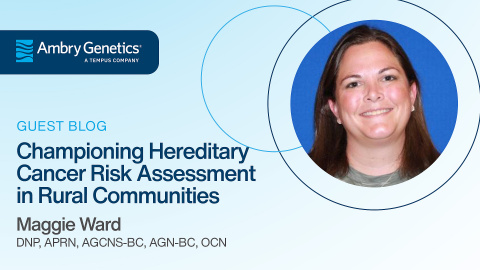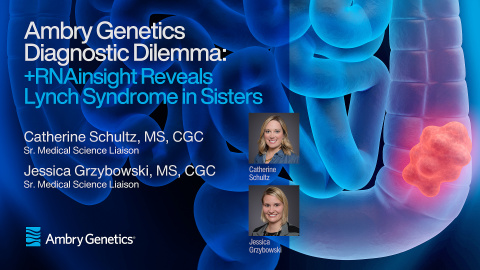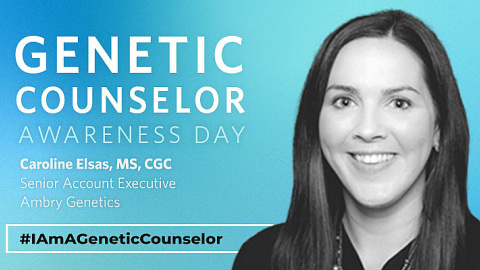- By Maggie Ward, DNP, APRN, AGCNS-BC, AGN-BC, OCN
- Posted September 10, 2025
Championing Hereditary Cancer Risk Assessment in Rural Communities
As an Advanced Practice Registered Nurse (APRN) in Wichita, KS, I’ve spent the last 20 years dedicated to oncology care. I lost my sister-in-law to breast cancer at a young age—she was only 29 years old when she was diagnosed and passed away at the age of 36. I became particularly interested in inherited cancers because of my niece. I wanted…
- By Jessica Scott, MGC, CGC
- Posted October 16, 2024
Polyposis Explained: Solving the Mystery with RNA Testing
As a genetic counselor at Cone Cancer Center for the last twelve years, Karen Powell, CGC, enjoys helping patients understand their cancer risks. Hereditary cancer testing may provide important and possibly life-saving information for not only the patient but their family members as well. Many patients present with a family history of cancer,…
- By Carrie Horton, MS, CGC
- Posted April 29, 2024
Addressing Disparities in Genetic Testing: Strategies for Improving Variant Classification Accuracy in Underrepresented Populations
Genetic testing has emerged as a powerful tool in personalized medicine, offering insights into individual health risks, disease predispositions, and treatment options. However, its effectiveness relies on the accuracy of the results. We know that individuals from non-White populations receive less informative genetic testing results compared to…
- By Shoji Ichikawa, PhD
- Posted March 19, 2024
The Benefits of RNA Testing for Neurological Disorders
Introduction Clinical genetic testing is a powerful diagnostic tool for neurological disorders. The utility of genetic testing can be diminished by the large number of variants of uncertain significance (VUS). Variant classification for neurological disorders has additional challenges because clinical evidence is often limited. The biggest limitation…
- By Carrie Horton, MS, CGC
- Posted February 23, 2024
Variant Interpretation in Real Time: Sometimes it Takes a Village
Every individual's genetic makeup is unique, containing the blueprint for their health, including susceptibility to diseases and potential response to treatments. But understanding your genes is like deciphering a complex code. DNA varies slightly from person to person, and interpreting the medical significance of those differences, or variants,…
- By Jessica Scott, MGC, CGC
- Posted January 17, 2024
The Patient Impact of Lab Expertise and Collaboration
“My advice for clinicians and healthcare providers who are ordering genetic testing is [that they] should feel that they are partners with the lab,” explains Chana Ratner, Genetic Counselor at Hackensack University Medical Center. We were grateful for the opportunity to connect with Chana and to discuss her experience as a clinical genetic…
- By Catherine Schultz, MS, CGC
- Posted March 23, 2023
Ambry Genetics Diagnostic Dilemma: +RNAinsight® Reveals Lynch Syndrome in Sisters
In recognition of Colon Cancer Awareness Month, Ambry would like to share the story of Jane and Julie Smith (not their real names) – sisters and cancer survivors. Jane was diagnosed with colon cancer in 2004 at the age of 36. While she was concerned about her diagnosis and family history of ovarian cancer, genetic testing was not widely available…
- By Caroline Elsas, MS, CGC
- Posted November 4, 2021
We Can Help Reduce Barriers to Cancer Genetic Testing
The world of hereditary cancer testing is complex, but genetic information is crucial for flagging at-risk patients and their relatives. They might just benefit from earlier and more frequent surveillance and/or preventive surgeries. For those individuals who face important and difficult health decisions, genetic counselors are invaluable members…
- By Aaron Elliott, PhD
- Posted October 21, 2020
+RNAinsight®: Finding Answers for More Patients - A Year in Review
It’s hard to believe that it has already been a year since we officially launched +RNAinsight, the first paired DNA/RNA genetic test for hereditary cancer. As we reach this milestone, I wanted to share with you why we set out to launch this product and reflect on our progress in finding more answers for patients. Ambry Genetics was founded with…
- By Tyler Landrith, PhD
- Posted March 5, 2020
Study Published in Nature Partner Journal Precision Oncology Confirms Clinical Utility of Simultaneous RNA and DNA Genetic Testing
DNA-based multigene panel testing (MGPT) is a commonly used approach for the detection of patients with or at-risk for inherited cancers. Despite years of advancement in genetic testing, patients may still receive uncertain results or receive a negative result despite having a personal or family history suggestive of hereditary cancer. RNA genetic…









